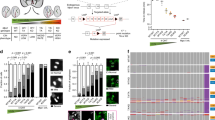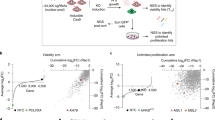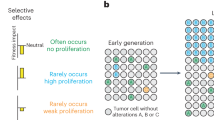Abstract
Aneuploidy, an abnormal chromosome number, has been recognized as a hallmark of human cancer for nearly a century1; however, the mechanisms responsible for this abnormality have remained elusive. Here we report the identification of mutations in hCDC4 (also known as Fbw7 or Archipelago) in both human colorectal cancers and their precursor lesions. We show that genetic inactivation of hCDC4, by means of targeted disruption of the gene in karyotypically stable colorectal cancer cells, results in a striking phenotype associated with micronuclei and chromosomal instability. This phenotype can be traced to a defect in the execution of metaphase and subsequent transmission of chromosomes, and is dependent on cyclin E—a protein that is regulated by hCDC4 (refs 2–4). Our data suggest that chromosomal instability is caused by specific genetic alterations in a large fraction of human cancers and can occur before malignant conversion.
This is a preview of subscription content, access via your institution
Access options
Subscribe to this journal
Receive 51 print issues and online access
$199.00 per year
only $3.90 per issue
Buy this article
- Purchase on Springer Link
- Instant access to full article PDF
Prices may be subject to local taxes which are calculated during checkout



Similar content being viewed by others
References
Boveri, T. Zur Frage der Enstehung maligner Tumoren (Gustav Fischer, Jena, Germany, 1914)
Winston, J. T., Koepp, D. M., Zhu, C., Elledge, S. J. & Harper, J. W. A family of mammalian F-box proteins. Curr. Biol. 9, 1180–1182 (1999)
Schwab, M. & Tyers, M. Cell cycle. Archipelago of destruction. Nature 413, 268–269 (2001)
Bartek, J. & Lukas, J. Cell cycle. Order from destruction. Science 294, 66–67 (2001)
Moberg, K. H., Bell, D. W., Wahrer, D. C., Haber, D. A. & Hariharan, I. K. Archipelago regulates Cyclin E levels in Drosophila and is mutated in human cancer cell lines. Nature 413, 311–316 (2001)
Spruck, C. H. et al. hCDC4 gene mutations in endometrial cancer. Cancer Res. 62, 4535–4539 (2002)
Strohmaier, H. et al. Human F-box protein hCdc4 targets cyclin E for proteolysis and is mutated in a breast cancer cell line. Nature 413, 316–322 (2001)
Orlicky, S., Tang, X., Willems, A., Tyers, M. & Sicheri, F. Structural basis for phosphodependent substrate selection and orientation by the SCFCdc4 ubiquitin ligase. Cell 112, 243–256 (2003)
Guex, N. & Peitsch, M. C. SWISS-MODEL and the Swiss-PdbViewer: an environment for comparative protein modeling. Electrophoresis 18, 2714–2723 (1997)
Koepp, D. M. et al. Phosphorylation-dependent ubiquitination of cyclin E by the SCFFbw7 ubiquitin ligase. Science 294, 173–177 (2001)
Spruck, C. H., Won, K. A. & Reed, S. I. Deregulated cyclin E induces chromosome instability. Nature 401, 297–300 (1999)
Nash, P. et al. Multisite phosphorylation of a CDK inhibitor sets a threshold for the onset of DNA replication. Nature 414, 514–521 (2001)
Goh, P. Y. & Surana, U. Cdc4, a protein required for the onset of S phase, serves an essential function during G2/M transition in Saccharomyces cerevisiae. Mol. Cell. Biol. 19, 5512–5522 (1999)
Jallepalli, P. V. et al. Securin is required for chromosomal stability in human cells. Cell 105, 445–457 (2001)
Kanda, T., Sullivan, K. F. & Wahl, G. M. Histone–GFP fusion protein enables sensitive analysis of chromosome dynamics in living mammalian cells. Curr. Biol. 8, 377–385 (1998)
Lengauer, C., Kinzler, K. W. & Vogelstein, B. Genetic instability in colorectal cancers. Nature 386, 623–627 (1997)
Savage, J. R. Acentric chromosomal fragments and micronuclei: the time-displacement factor. Mutat. Res. 225, 171–173 (1989)
Lengauer, C., Kinzler, K. W. & Vogelstein, B. Genetic instabilities in human cancers. Nature 396, 643–649 (1998)
Cahill, D. P. et al. Mutations of mitotic checkpoint genes in human cancers. Nature 392, 300–303 (1998)
Thiagalingam, S. Evaluation of chromosome 18q in colorectal cancers. Nature Genet. 13, 343–346 (1996)
Pihan, G. A. et al. Centrosome defects and genetic instability in malignant tumors. Cancer Res. 58, 3974–3985 (1998)
Rajagopalan, H., Nowak, M. A., Vogelstein, B. & Lengauer, C. The significance of unstable chromosomes in colorectal cancer. Nature Rev. Cancer 3, 695–701 (2003)
Sieber, O. M., Heinimann, K. & Tomlinson, I. P. Genomic instability—the engine of tumorigenesis? Nature Rev. Cancer 3, 701–708 (2003)
Nowak, M. A. et al. The role of chromosomal instability in tumor initiation. Proc. Natl Acad. Sci. USA 99, 16226–16231 (2002)
Sieber, O. M. et al. Analysis of chromosomal instability in human colorectal adenomas with two mutational hits at APC. Proc. Natl Acad. Sci. USA 99, 16910–16915 (2002)
Shih, I. M. et al. Evidence that genetic instability occurs at an early stage of colorectal tumorigenesis. Cancer Res. 61, 818–822 (2001)
Bardelli, A. et al. Mutational analysis of the tyrosine kinome in colorectal cancers. Science 300, 949 (2003)
Shirasuna, K., Sato, M. & Miyazaki, T. A neoplastic epithelial duct cell line established from an irradiated human salivary gland. Cancer 48, 745–752 (1981)
Acknowledgements
We thank L. Meszler and L. Morsberger for technical assistance; A. Rosen and S. White for reagents; and the members of our Center for Cancer Genetics and Therapeutics for help and support. This work was supported by the Clayton Fund, NIH grants, and a Translational Research Award from the Virginia and D. K. Ludwig Fund for Cancer Research.
Author information
Authors and Affiliations
Corresponding author
Ethics declarations
Competing interests
The authors declare that they have no competing financial interests.
Supplementary information
Supplementary Figure 1
Time-lapse video-microscopy images of a dividing HCT116 hCDC4-/- cell expressing histone-GFP (see Methods). (PDF 109 kb)
Supplementary Table 1
Summary of hCDC4 mutations in colorectal neoplasms. (PDF 57 kb)
Supplementary Table 2
Formation of micronuclei. (PDF 41 kb)
Supplementary Movie 1
Time-lapse videomicroscopy movie of a dividing HCT116 hCDC4-/- cell shows a failure of chromosomes to properly align on metaphase plate. Mitosis results in an unequal segregation of nuclear material. (MOV 727 kb)
Rights and permissions
About this article
Cite this article
Rajagopalan, H., Jallepalli, P., Rago, C. et al. Inactivation of hCDC4 can cause chromosomal instability. Nature 428, 77–81 (2004). https://doi.org/10.1038/nature02313
Received:
Accepted:
Issue Date:
DOI: https://doi.org/10.1038/nature02313
This article is cited by
-
Cisplatin-induced cell death increases the degradation of the MRE11-RAD50-NBS1 complex through the autophagy/lysosomal pathway
Cell Death & Differentiation (2023)
-
E3-ubiquitin ligase, FBXW7 regulates mitotic progression by targeting BubR1 for ubiquitin-mediated degradation
Cellular and Molecular Life Sciences (2023)
-
FBXW7-mediated ERK3 degradation regulates the proliferation of lung cancer cells
Experimental & Molecular Medicine (2022)
-
Ubiquitin–proteasome system (UPS) as a target for anticancer treatment
Archives of Pharmacal Research (2020)
-
FBXW7: a critical tumor suppressor of human cancers
Molecular Cancer (2018)
Comments
By submitting a comment you agree to abide by our Terms and Community Guidelines. If you find something abusive or that does not comply with our terms or guidelines please flag it as inappropriate.



